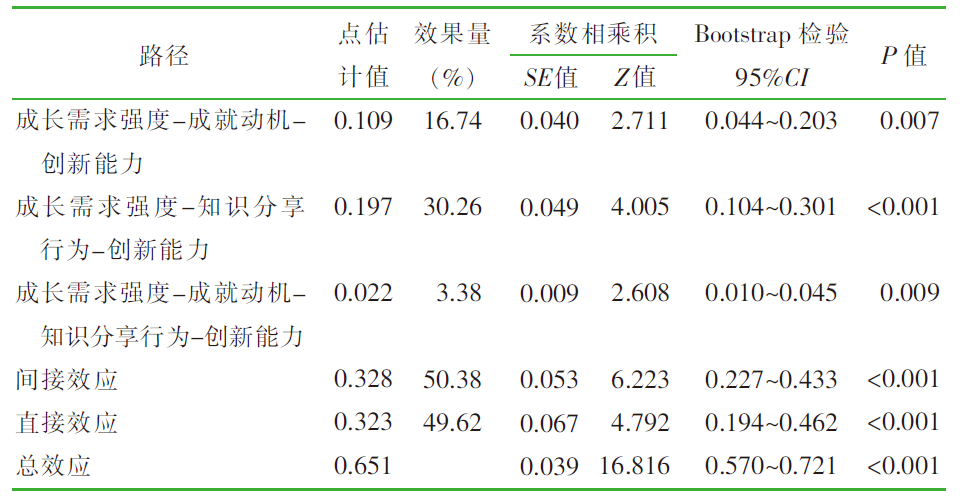| [1] |
张璐, 杨庆爱, 王若维. 护理专业本科生创新能力内涵及构成要素的探讨[J]. 护理研究, 2016, 30(10):1251-1253.
|
|
Zhang L, Yang QA, Wang RW. Probe into of connotation and constituent elements of innovation ability of nursing undergraduates[J]. Chin Nurs Res, 2016, 30(10):1251-1253.
|
| [2] |
李昆, 聂文博, 彭歆, 等. 护理本科生科研创新能力培养的实践研究[J]. 中华护理教育, 2021, 18(8):677-681.
|
|
Li K, Nie WB, Peng X, et al. The study on cultivating scientific research ability of undergraduate nursing students[J]. Chin J Nurs Educ, 2021, 18(8):677-681.
|
| [3] |
邵鸯凤, 陈雪萍, 程丽娟, 等. 课外活动在护理本科生创新能力培养中的应用[J]. 中华护理教育, 2019, 16(8):594-597.
|
|
Shao YF, Chen XP, Cheng LJ, et al. The application of extracurricular activities in the cultivation of undergraduates’ innovative ability[J]. Chin J Nurs Educ, 2019, 16(8):594-597.
|
| [4] |
Tims M, Bakker AB. Job crafting:towards a new model of individual job redesign[J]. SA J Ind Psychol, 2010, 36(2):1-9.
|
| [5] |
刘玉, 许国动. 我国大学生精神成长需求的研究进展与展望:基于CNKI文献数据的计量分析[J]. 教育探索, 2020(8):51-55.
|
|
Liu Y, Xu GD. Research progress and outlook on the spiritual growth needs of college students in China-an econometric analysis based on CNKI literature data[J]. Educ Explor, 2020(8):51-55.
|
| [6] |
Ryan RM, Deci EL. Self-determination theory and the facilitation of intrinsic motivation,social development,and well-being[J]. Am Psychol, 2000, 55(1):68-78.
pmid: 11392867
|
| [7] |
Li JL, Wu N, Xiong SX. Sustainable innovation in the context of organizational cultural diversity:the role of cultural intelligence and knowledge sharing[J]. PLoS One, 2021, 16(5):e0250878.
|
| [8] |
郭娜娜. Amabile创造力理论述评[J]. 知识经济, 2012(10):51.
|
| [9] |
Obrenovic B, Du JG, Tsoy D, et al. The enjoyment of knowledge sharing:impact of altruism on tacit knowledge-sharing behavior[J]. Front Psychol, 2020, 11:1496.
doi: 10.3389/fpsyg.2020.01496
pmid: 32765348
|
| [10] |
Hackman JR, Oldham GR. Work redesign[M]. Reading,Mass.:Addison-Wesley, 1980:286-287.
|
| [11] |
王凤娟. 成长需求强度对员工工作绩效的影响:地位竞争视角[D]. 武汉: 华中科技大学, 2016.
|
|
Wang FJ. The effect of growth-need strength on employees’ job performance:the perspective of status competition[D]. Wuhan: Huazhong University of Science and Technology, 2016.
|
| [12] |
Nygård R, Gjesme T. Assessment of achievement motives:comments and suggestions[J]. Scand J Educ Res, 1973, 17(1):39-46.
doi: 10.1080/0031383730170104
|
| [13] |
叶仁敏, Hagtvet KA. 成就动机的测量与分析[J]. 心理发展与教育, 1992, 8(2):14-16.
|
| [14] |
王雁飞, 朱瑜. 组织社会化、信任、知识分享与创新行为:机制与路径研究[J]. 研究与发展管理, 2012, 24(2):34-46.
|
| [15] |
张振刚, 余传鹏, 李云健. 主动性人格、知识分享与员工创新行为关系研究[J]. 管理评论, 2016, 28(4):123-133.
|
| [16] |
Janssen O. Job demands,perceptions of effort-reward fairness and innovative work behaviour[J]. J Occup Organ Psychol, 2000, 73(3):287-302.
doi: 10.1348/096317900167038
|
| [17] |
赵志清, 刘以娟, 邵冰, 等. 本科护生创新行为分析[J]. 护理研究, 2011, 25(30):2752-2753.
|
|
Zhao ZQ, Liu YJ, Shao B, et al. Analysis on innovative behaviors of nursing undergraduates[J]. Chin Nurs Res, 2011, 25(30):2752-2753.
|
| [18] |
吴小婷, 储爱琴, 张海玲, 等. 职业认同感在护理本科实习生成就动机和科研能力间的中介作用[J]. 中华现代护理杂志, 2020, 26(18):2503-2508.
|
| [19] |
张港娜, 周英. 护生创新能力现状及培养策略研究进展[J]. 护理研究, 2021, 35(12):2168-2171.
|
|
Zhang GN, Zhou Y. Status quo of the innovation ability of nursing students and research progress on training strategies[J]. Chin Nurs Res, 2021, 35(12):2168-2171.
|




